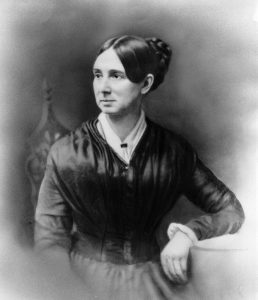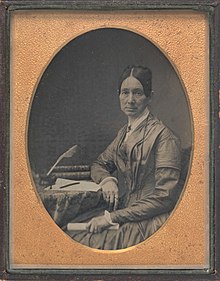Dorothea L. Dix
Dorothea Lynde Dix was among the Civil War women of note who were also in Stafford during the “Valley Forge”-period and was one of the more famous women in the war. Widely known before the war as a social reformer, she had worked tirelessly for better treatment for the mentally ill and women in prison. Dix, born in 1802 in Hampden, Maine, had overcome a difficult youth, dysfunctional family and frustrated romantic relationship to head several schools in Massachusetts, investigate mental health and female prison issues of her day, and help establish two state hospitals. At age 59, with the start of the Civil War she volunteered her services and became the Superintendent of Female Nurses for the Union Army. In that capacity she organized the women, placed them in hospitals, and inspected the facilities regularly. Miss Dix also raised money for medical supplies. Famously known as “Dragon Dix” (for her formidable and brusque sternness), she certainly ran a tight ship. She outlawed hiring young and attractive women on the grounds that they would dwell too much on romantic and marriage possibilities. She dressed them in drab black or brown and forbade ringlets, hoops or jewelry. Despite such draconian measures Dorothea managed to assemble a nursing force of over 3,000 women, who worked predominantly in the wartime general hospitals of the North. After the war Miss Dix returned to working for mental health improvements. At 80, she retired and lived in an apartment at the New Jersey State Hospital she had created. Even when invalided in her late years, she maintained an active correspondence from her bed. She died there in 1887 and was buried at Mount Auburn Cemetery in Cambridge, Massachusetts. Her gravestone is marked expansively and lavishly with predictable sentimentality: “Dorothea L. Dix.”


